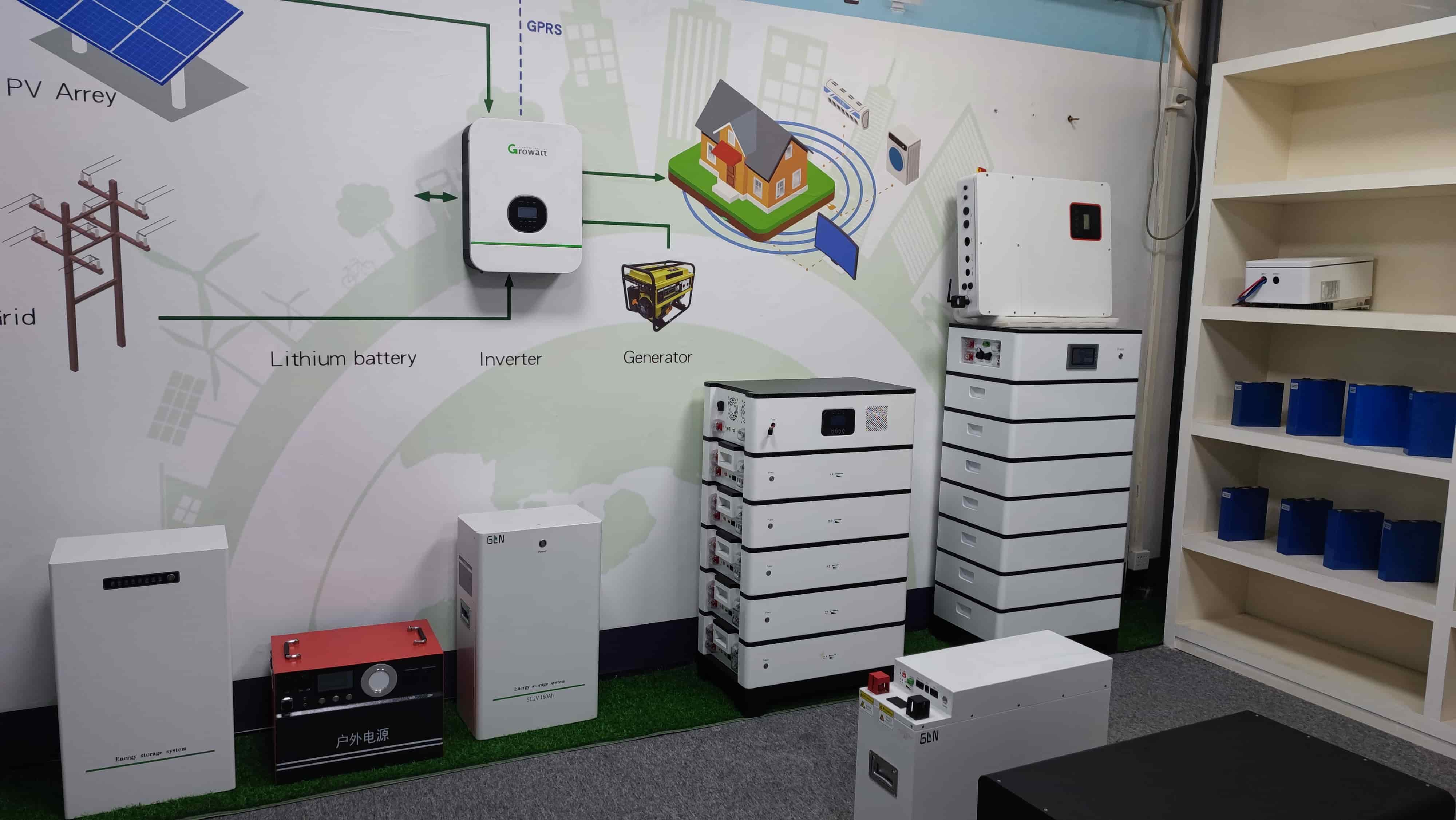Lithium Battery For Solar: A Green Energy Revolution
Coincidences have a way of propelling us into a future we never imagined. And for those seeking a greener, more sustainable energy solution, the coincidence of lithium batteries and solar power is nothing short of revolutionary.
The combination of these two technologies has sparked a green energy revolution that is transforming the way we harness and store solar power.
With lithium batteries, solar energy storage has become more efficient, reliable, and accessible than ever before. Gone are the days of relying solely on the sun's rays during daylight hours. Now, you can store excess solar energy in lithium batteries, ensuring a constant and uninterrupted power supply even when the sun goes down.
This breakthrough not only empowers individuals to become self-sufficient energy producers, but it also paves the way for a more sustainable future.
In this article, we will explore the benefits, advancements, and challenges of lithium batteries in solar energy storage. Join us as we delve into the world of lithium batteries for solar, and discover the exciting possibilities this green energy revolution holds for a brighter tomorrow.
Key Takeaways:
- The combination of lithium batteries and solar power has sparked a green energy revolution.
- Lithium batteries make solar energy storage more efficient, reliable, and accessible.
- Lithium batteries empower individuals to become self-sufficient energy producers.
- Advances in lithium battery technology for solar enhance efficiency and performance.

Understanding Lithium Batteries
If you're curious about lithium batteries for solar energy, let's start with the basics.
Lithium batteries are rechargeable batteries that use lithium as the main component in their electrochemical cells. They are composed of a positive electrode called the cathode, a negative electrode called the anode, and an electrolyte in between.
There are various types of lithium batteries, including lithium-ion and lithium iron phosphate, each with its own unique characteristics and advantages.
Definition and Composition of Lithium Batteries
The composition of lithium batteries includes a combination of lithium ions and a conductive electrolyte. These batteries are widely used in various applications, including solar energy systems.
Here are five key components that make up a lithium battery:
- Lithium Cobalt Oxide (LiCoO2): This is the most common cathode material used in lithium batteries.
- Lithium Iron Phosphate (LiFePO4): This cathode material offers a longer lifespan and enhanced safety features.
- Lithium Nickel Manganese Cobalt Oxide (LiNiMnCoO2): This cathode material provides a balance between energy density and stability.
- Graphite Anode: It stores and releases lithium ions during the charging and discharging process.
- Conductive Electrolyte: It allows the movement of lithium ions between the cathode and anode.
Understanding the composition of lithium batteries is crucial when considering their suitability for solar applications. These batteries offer high energy density, long cycle life, and excellent performance, making them an ideal choice for solar energy storage.
Solar Energy and Battery Storage
In this discussion, you'll learn about the overview of solar energy systems and the importance of energy storage. You'll also explore the role of batteries in solar power storage.
Understanding these key points is crucial for grasping the concept of solar energy and how it can be effectively stored for later use.
Overview of Solar Energy Systems
Get ready to delve into the dazzling details of solar energy systems. When it comes to harnessing the power of the sun, solar energy systems are at the forefront.
These systems consist of solar panels that absorb sunlight and convert it into electricity. The panels are typically mounted on rooftops or in large fields, maximizing their exposure to the sun's rays.
The electricity generated by the panels is then stored in batteries for later use. This is where lithium batteries come in. Lithium batteries are commonly used in solar energy systems due to their high energy density, longer lifespan, and ability to withstand harsh environmental conditions. They efficiently store the electricity generated by the solar panels, ensuring a continuous and reliable power supply even when the sun isn't shining.
So, with a solar energy system and a trusty lithium battery, you can truly embrace the power of the sun.
Importance of Energy Storage
Now that you have a good understanding of solar energy systems, let's dive into the importance of energy storage.
Energy storage is a crucial component of any solar energy system because it allows you to store excess energy generated during the day for use during the night or during periods of low sunlight. This ensures a constant and reliable power supply, even when the sun isn't shining.
Here are three reasons why energy storage is important for solar energy systems:
1. Maximizing self-consumption: By storing excess energy, you can maximize your self-consumption, reducing your reliance on the grid and saving on electricity costs.
2. Backup power: Energy storage provides a backup power source during power outages, ensuring that your essential appliances and devices continue to function.
3. Grid stabilization: Energy storage systems help stabilize the grid by balancing supply and demand, reducing the strain on the electrical infrastructure.
With energy storage, you can make the most of your solar energy system and enjoy an uninterrupted power supply.

Benefits of Lithium Battery for Solar Energy Storage
Lithium batteries are a game-changer for solar energy storage, providing numerous benefits such as longer lifespan and higher efficiency.
For instance, imagine being able to power your entire home with solar energy even during a blackout, ensuring your family's safety and comfort while reducing your reliance on fossil fuels. With lithium batteries, you can store excess energy generated by your solar panels during the day and use them when the sun goes down or during cloudy days. This means you can have a continuous and reliable source of power, reducing the need for traditional electricity sources.
Lithium batteries have a low self-discharge rate, which means they can hold their charge for longer periods of time. Additionally, lithium batteries have a longer lifespan compared to other battery options, which means you won't have to replace them as frequently, saving you money in the long run. Moreover, these batteries have higher efficiency, meaning they can store and release energy more effectively, maximizing the utilization of your solar panels.
Lastly, lithium batteries are easy to charge and maintain. To test their capacity, you can use specialized equipment, and when charging for the first time, it's important to follow the lithium battery manufacturer's instructions.
Overall, lithium batteries are revolutionizing the solar industry, making solar energy storage more accessible, reliable, and cost-effective. As we delve into how lithium batteries are transforming the solar industry, you'll discover even more exciting advancements in this green energy revolution.

How Lithium Batteries are Transforming the Solar Industry
Imagine how your solar setup can be completely transformed with the use of these innovative batteries. Lithium batteries are revolutionizing the solar industry and bringing about a new era of green energy. Here are a few reasons why they're transforming the solar industry:
- Longer lifespan: Lithium batteries have a significantly longer lifespan compared to traditional lead-acid batteries. This means you can enjoy uninterrupted solar power for a longer period of time without worrying about frequent replacements.
- Higher energy density: Lithium batteries have a higher energy density, which means they can store more energy in a smaller and lighter package. This makes them ideal for solar applications where space is limited.
- Faster charging: Lithium batteries can be charged at a much faster rate compared to other battery technologies. This means you can quickly recharge your batteries during the day and have access to stored solar energy even during cloudy periods.
- Enhanced efficiency: Lithium batteries have a higher charge-discharge efficiency, allowing you to maximize the energy generated by your solar panels. This means you can make the most out of every ray of sunshine.
With these advantages, lithium batteries are paving the way for a sustainable energy future. They're not only transforming the solar industry but also playing a crucial role in creating a greener and cleaner planet.
The Role of Lithium Batteries in a Sustainable Energy Future
One key aspect of a sustainable energy future is the extended lifespan of these innovative batteries, which ensures uninterrupted power without the need for frequent replacements.
Lithium batteries have revolutionized the solar industry by providing a reliable and efficient energy storage solution. With their ability to store excess solar energy during the day and release it at night, lithium batteries have become an essential component of off-grid and grid-tied solar systems.
In addition to their long lifespan, lithium batteries offer other benefits that contribute to a sustainable energy future. They have a high energy density, meaning they can store a large amount of energy in a small and lightweight package. This makes them ideal for both residential and commercial solar installations, as they take up minimal space and can be easily transported.
Furthermore, lithium batteries are known for their quick charging capabilities. They can be charged at a faster rate compared to other battery technologies, allowing for more efficient use of solar energy. This not only reduces the reliance on fossil fuels but also maximizes the utilization of renewable energy sources.
As advances in lithium battery technology for solar continue, we can expect even greater efficiency and performance. These advancements will further enhance the role of lithium batteries in a sustainable energy future, making them an integral part of the transition toward greener and cleaner energy sources.

Advances in Lithium Battery Technology for Solar
Get ready to be amazed by the latest advancements in battery technology for harnessing the power of the sun and taking your energy independence to new heights. With the rapid growth of solar energy, lithium batteries have become an essential component in storing and utilizing this renewable resource efficiently. These batteries have witnessed significant improvements in recent years, making them an ideal choice for solar installations.
Innovations in lithium battery technology have led to enhanced performance and increased efficiency. To give you a glimpse of these advancements, let's take a look at a 2-column, 5-row table:
| Advancements | Benefits |
| Longer lifespan | Reduced need for frequent replacements |
| Faster charging | Minimized downtime for power generation |
| Higher energy density | Increased storage capacity |
| Improved safety features | Mitigated risks of accidents |
| Enhanced thermal management system | Better performance in extreme conditions |
These advancements have revolutionized the solar energy landscape, offering numerous financial and environmental benefits to users. The subsequent section will delve into how lithium batteries not only save you money but also contribute to a greener and more sustainable future. So, get ready to explore the financial and environmental benefits of lithium batteries for solar users, and discover how they can transform your energy consumption.
Financial and Environmental Benefits of Lithium Batteries for Solar Users
Let's dive into the exciting advantages of using lithium batteries in harnessing the power of the sun, both in terms of finances and the environment.
With lithium batteries, you can save a significant amount of money on your electricity bills. By storing excess solar energy during the day and using it during peak hours or at night, you can reduce your reliance on the grid and avoid high utility rates. Additionally, lithium batteries have a longer lifespan compared to other battery technologies, which means you won't have to replace them as frequently, further saving you money in the long run.
Not only do lithium batteries provide financial benefits, but they also have a positive impact on the environment. By using solar energy and storing it in lithium-ion batteries, you are reducing your carbon footprint. This lithium-ion battery renewable energy source produces zero emissions, unlike traditional fossil fuels. Moreover, lithium batteries are recyclable, making them a sustainable choice for energy storage.

Best Practices for Solar Lithium Battery Systems
When it comes to solar lithium battery systems, there are a few best practices you should keep in mind.
First, proper sizing and capacity planning is crucial to ensure optimal performance and longevity of your system.
Additionally, regular maintenance and monitoring are necessary to keep your batteries in top condition.
Lastly, implementing safety measures and proper handling techniques is essential to prevent any accidents or damage.
Proper Sizing and Capacity Planning
To ensure your lithium battery for solar is properly sized and planned for, you'll need to consider factors like your energy demands and the capacity required to meet them. Here are some important points to keep in mind:
- Determine your energy consumption: Calculate how much energy your solar system will need to generate based on your daily usage.
- Consider peak demand: Take into account any spikes in energy usage during specific times of the day or year.
- Account for weather conditions: If you live in an area with unpredictable weather patterns, ensure your battery capacity can handle extended periods of low sunlight.
- Plan for future growth: Anticipate any potential increase in energy demands and factor in the capacity to accommodate it.
- Consult with experts: Seek advice from professionals who can guide you in accurately sizing and planning your lithium battery system. For reliable and efficient solutions, reach out to Harvey Power today and take the first step toward harnessing the full potential of your energy storage system.
By considering these factors, you can ensure that your lithium battery for solar is properly sized and planned to meet your energy needs effectively.
Maintenance and Monitoring
Make sure you regularly maintain and monitor your system to ensure its optimal performance, as studies have shown that solar energy systems that receive regular maintenance have a 30% higher energy output over their lifespan. To help you keep track of your lithium battery for the solar system, here is a table that outlines some key maintenance and monitoring tasks:
| Task | Frequency |
| Check battery voltage | Monthly |
| Inspect battery terminals | Every 3 months |
| Clean battery enclosure | Every 6 months |
| Test battery capacity | Annually |
| Monitor for any abnormalities | Daily |
By following these maintenance and monitoring tasks, you can ensure that your lithium battery for solar system operates at its best, maximizing energy output and extending its lifespan. Remember, a well-maintained system is a more efficient and reliable one.
Safety Measures and Handling
Ensuring the safety and proper handling of your energy system is essential for a smooth and worry-free experience. When it comes to lithium batteries for solar, there are a few key safety measures to keep in mind.
First and foremost, always handle the batteries with care and avoid dropping or damaging them. It's also crucial to store the batteries in a cool and dry place, away from direct sunlight and extreme temperatures.
Regularly inspect the batteries for any signs of damage or leakage, and if you notice any issues, contact a professional immediately. Additionally, it's important to follow the manufacturer's guidelines for charging and discharging the batteries to prevent overcharging or discharging, which can be dangerous.
By following these safety measures, you can ensure the longevity and efficiency of your lithium battery system.
Transitioning into the subsequent section about challenges and future outlook for lithium batteries in solar energy storage, it is important to note that while lithium batteries offer numerous advantages, there are still some obstacles to overcome.

Challenges and Future Outlook for Lithium Batteries in Solar Energy Storage
In this next discussion, we will explore the challenges and future outlook for lithium batteries in solar energy storage.
One important aspect to consider is the recycling and disposal of lithium batteries, as their widespread use raises concerns about their environmental impact.
Additionally, ongoing R&D efforts are aiming to further improve the performance and lifespan of these batteries.
Lastly, we will delve into the integration of lithium batteries with other renewable energy technologies, as this holds great potential for a more efficient and sustainable energy system.
Recycling and Disposal of Lithium Batteries
Recycling and disposal of lithium batteries, are we effectively addressing the environmental impact of this green energy revolution? It's crucial to consider the end-of-life phase of lithium batteries to ensure sustainable practices.
Here are three key aspects to focus on:
1. Collection: Implementing efficient collection systems is essential to prevent batteries from ending up in landfills. Encouraging consumers to return their used batteries to designated recycling centers can help ensure proper disposal.
2. Recovery: Developing advanced technologies for battery recycling is vital. By recovering valuable materials like lithium, cobalt, and nickel, we can reduce reliance on mining and promote a circular economy.
3. Safety: Proper handling and disposal of lithium batteries are crucial to minimize environmental hazards. Establishing strict regulations and guidelines for safe storage, transportation, and recycling can help mitigate potential risks.
By addressing these aspects, we can make significant progress in mitigating the environmental impact of lithium batteries.
Now let's delve into the ongoing R&D efforts for further improvements in this field.
R&D Efforts for Further Improvements
Researchers are actively exploring innovative solutions to enhance the sustainability and efficiency of battery technology. One area of focus is the development of new materials and manufacturing processes that can improve the performance and lifespan of lithium batteries. For example, researchers are experimenting with alternative electrode materials such as silicon and lithium sulfur, which have the potential to increase energy density and reduce costs. Additionally, efforts are being made to optimize battery management systems and improve charging algorithms to maximize efficiency and minimize degradation.
To provide a visual representation of the ongoing research efforts, here is a table showcasing some of the key areas of R&D for further improvements in lithium battery technology:
| R&D Focus | Potential Benefits |
| New electrode materials | Higher energy density and lower costs |
| Enhanced battery management systems | Improved performance and lifespan |
| Optimization of charging algorithms | Increased efficiency and reduced degradation |
These research endeavors aim to propel lithium battery technology to new heights, making it an integral part of the integration with other renewable energy technologies.
Integration with Other Renewable Energy Technologies
As renewable technologies continue to evolve, the seamless integration of advanced battery systems becomes crucial for maximizing the potential of sustainable power sources.
One of the key advantages of lithium batteries for solar is their compatibility with other renewable energy technologies. By integrating lithium battery storage with solar panels, wind turbines, or even hydroelectric power systems, you can create a comprehensive and efficient renewable energy solution.
This integration allows for the storage of excess energy generated during peak production periods, which can then be used during times of low production. Furthermore, the combination of different renewable energy sources with lithium batteries provides a more reliable and stable power supply, reducing the reliance on traditional fossil fuel-based energy sources.
This integration represents a significant step towards a greener and more sustainable energy revolution.

Conclusion
Congratulations! You've learned about the green energy revolution brought by lithium batteries for solar. By embracing this technology, you can transform the solar industry and contribute to a sustainable future.
Did you know that using lithium batteries can reduce greenhouse gas emissions by up to 80% compared to traditional energy sources? This staggering statistic highlights the significant environmental benefits of lithium batteries, making them an essential component in the fight against climate change.
So go ahead, make the switch, and be a part of the renewable energy revolution!
Learn More Top Questions About Lithium Batteries!
